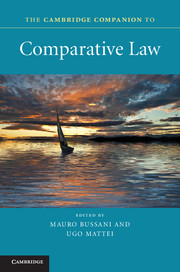Book contents
- Frontmatter
- Contents
- Contributors
- Abbreviations
- Preface
- Part I Knowing comparative law
- Part II Comparative law fields
- Part III Comparative law in the flux of civilizations
- 12 The East Asian legal tradition
- 13 The Jewish legal tradition
- 14 The Islamic legal tradition
- 15 The sub-Saharan legal tradition
- 16 The Latin American and Caribbean legal traditions
- 17 Mixed legal systems
- 18 Democracy and the Western legal tradition
- Index
- References
18 - Democracy and the Western legal tradition
Published online by Cambridge University Press: 05 May 2013
- Frontmatter
- Contents
- Contributors
- Abbreviations
- Preface
- Part I Knowing comparative law
- Part II Comparative law fields
- Part III Comparative law in the flux of civilizations
- 12 The East Asian legal tradition
- 13 The Jewish legal tradition
- 14 The Islamic legal tradition
- 15 The sub-Saharan legal tradition
- 16 The Latin American and Caribbean legal traditions
- 17 Mixed legal systems
- 18 Democracy and the Western legal tradition
- Index
- References
Summary
Introduction
The availability of democracy is usually presented as a prerequisite for any evaluation, be it political, economic, or legal, of any country, and as an imperative to pursue (with or without Western help) for all societies that do not enjoy it.
Here it cannot be discussed how political scientists define democracy and the bases for those definitions, nor can it be debated whether the ‘just’ is inherent in notions of democracy. What is evident in the global arena, however, is that besides those who consider the non-democratic societies to be pathological, there are those who view our democracies as local expressions of a particular culture and those who, for given places and ages, discuss the merits of different forms of government, including those of an autocratic or epistocratic nature. Nowadays the latter views recur in particular in and about east Asian and Islamic societies. It is difficult to challenge any of these perspectives without being dogmatic and in a way that respects the cultural differences of the ‘others’. Yet one can start by noting two points. First, entrusting power to a wise or an autocratic elite presupposes agreement about the ‘wisdom’ and the qualities of these elites, which, in turn, requires a social body generally sharing homogeneous values. These are requirements that one cannot take for granted for the long term, particularly today, in the majority of known societies. Second, in non-democratic forms of government, there are no guarantees of the rulers’ culture and preferences remaining in step with the changing needs of the society. The lack of adaptation to societal needs, on the one hand, does not deter authoritarian shifts aimed at imposing the ruler’s views on the social body, and, on the other hand, makes it certain that its inner flexibility and receptiveness to change make democracy preferable ‘over time’. This ought to be considered as crucial, and also biologically inevitable, if each generation, and each of us, accepts that it answers to the next and subsequent generations like a tenant to the landlord.
- Type
- Chapter
- Information
- The Cambridge Companion to Comparative Law , pp. 384 - 396Publisher: Cambridge University PressPrint publication year: 2012
References
- 2
- Cited by

